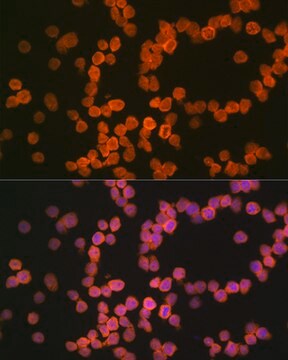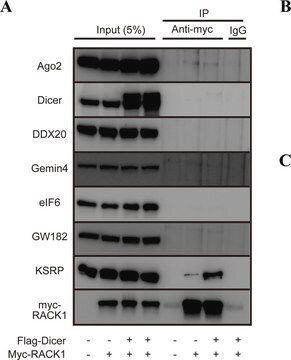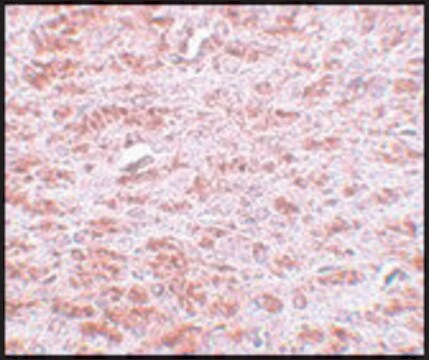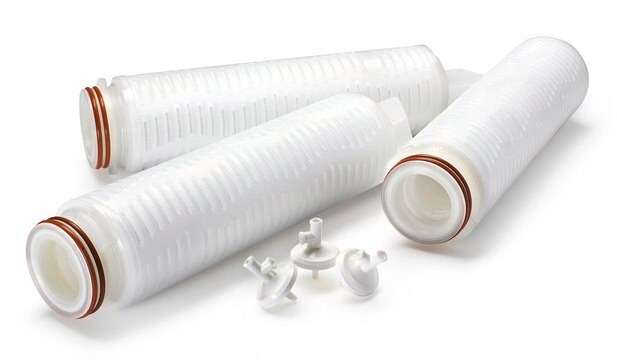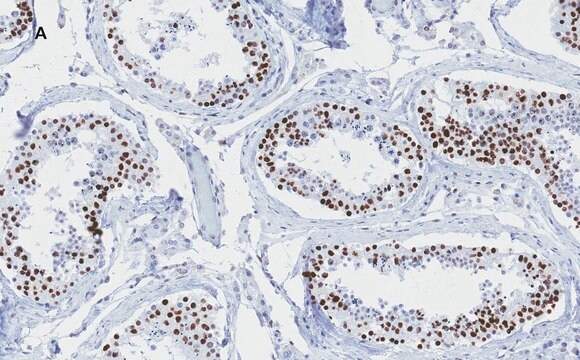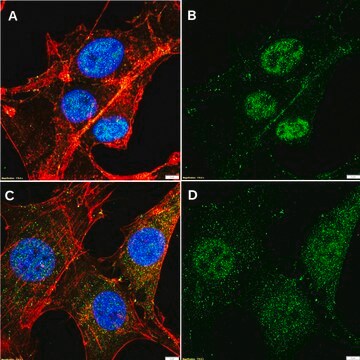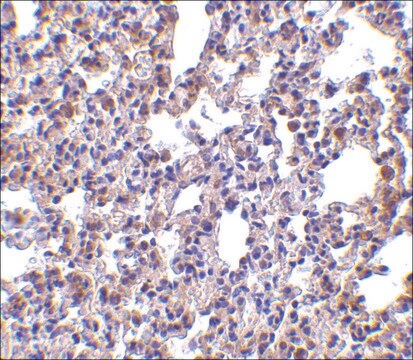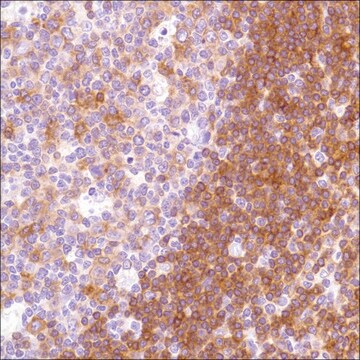SAB4700117
Monoclonal Anti-CD20-FITC antibody produced in mouse
clone 2H7, purified immunoglobulin, buffered aqueous solution
Sinonimo/i:
Anti-MS4A1
Autenticatiper visualizzare i prezzi riservati alla tua organizzazione & contrattuali
About This Item
Codice UNSPSC:
12352203
NACRES:
NA.44
Prodotti consigliati
Origine biologica
mouse
Livello qualitativo
Coniugato
FITC conjugate
Forma dell’anticorpo
purified immunoglobulin
Tipo di anticorpo
primary antibodies
Clone
2H7, monoclonal
Stato
buffered aqueous solution
Reattività contro le specie
human, nonhuman primates
tecniche
flow cytometry: suitable
Isotipo
IgG2a
N° accesso NCBI
N° accesso UniProt
Condizioni di spedizione
wet ice
Temperatura di conservazione
2-8°C
modifica post-traduzionali bersaglio
unmodified
Informazioni sul gene
human ... MS4A1(931)
Descrizione generale
CD20 is a cell surface 33-37 (depending on the degree of phosphorylation) kDa non-glycosylated surface phosphoprotein expressed on mature and most malignant B cells, but not stem cells or plasma cells (low number of the CD20 has been also detected on a subpopulation of T lymphocytes and it can be expressed on follicular dendritic cells). Its expression on B cells is synchronous with the expression of surface IgM. CD20 regulates transmembrane calcium conductance (probably functioning as a component of store-operated calcium channel), cell cycle progression and B-cell proliferation. It is associated with lipid rafts, but the intesity of this association depends on extracellular triggering, employing CD20 conformational change and/or BCR (B cell antigen receptor) aggregation. After the receptor ligation, BCR amd CD20 colocalize and then rapidly dissociate before BCR endocytosis, whereas CD20 remains at the cell surface. CD20 serves as a useful target for antibody-mediated therapeutic depletion of B cells, as it is expressed at high levels on most B-cell malignancies, but does not become internalized or shed from the plasma membrane following mAb treatment.
Specificità
The antibody 2H7 reacts with CD20 (Bp35), a 33-37 kDa non-glycosylated membrane receptor with four transmembrane domains, expressed on B lymphocytes (it is lost on plasma cells), follicular dendritic cells, and at low levels on peripheral blood T lymphocytes.
Immunogeno
Human tonsillar B cells
Applicazioni
The reagent is designed for Flow Cytometry analysis of human blood cells using 20 μL reagent / 100 μL of whole blood or 1e6 cells in a suspension. The content of a vial (2 mL) is sufficient for 100 tests.
Caratteristiche e vantaggi
Evaluate our antibodies with complete peace of mind. If the antibody does not perform in your application, we will issue a full credit or replacement antibody. Learn more.
Stato fisico
Solution in phosphate buffered saline containing 15 mM sodium azide and 0.2% high-grade protease free BSA as a stabilizing agent.
Esclusione di responsabilità
Unless otherwise stated in our catalog or other company documentation accompanying the product(s), our products are intended for research use only and are not to be used for any other purpose, which includes but is not limited to, unauthorized commercial uses, in vitro diagnostic uses, ex vivo or in vivo therapeutic uses or any type of consumption or application to humans or animals.
Non trovi il prodotto giusto?
Prova il nostro Motore di ricerca dei prodotti.
Codice della classe di stoccaggio
10 - Combustible liquids
Classe di pericolosità dell'acqua (WGK)
WGK 2
Punto d’infiammabilità (°F)
Not applicable
Punto d’infiammabilità (°C)
Not applicable
Scegli una delle versioni più recenti:
Possiedi già questo prodotto?
I documenti relativi ai prodotti acquistati recentemente sono disponibili nell’Archivio dei documenti.
Jessica L Teeling et al.
Journal of immunology (Baltimore, Md. : 1950), 177(1), 362-371 (2006-06-21)
We have previously defined a panel of fully human CD20 mAb. Most of these were unexpectedly efficient in their ability to recruit C1q to the surface of CD20-positive cells and mediate tumor lysis via activation of the classical pathway of
Il team dei nostri ricercatori vanta grande esperienza in tutte le aree della ricerca quali Life Science, scienza dei materiali, sintesi chimica, cromatografia, discipline analitiche, ecc..
Contatta l'Assistenza Tecnica.